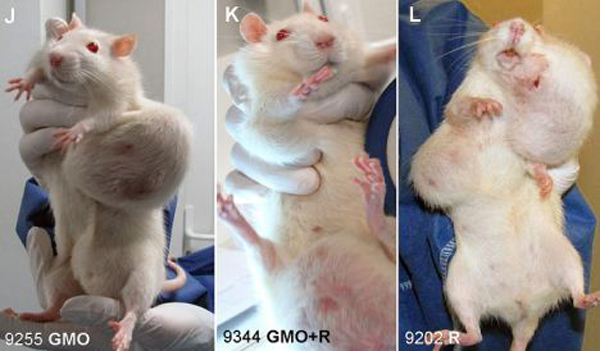Russia's consumer protection group, Rospotrebnadzor, said it was halting all imports of GM corn while the country's Institute of Nutrition will be evaluating the results of the study.
The Russian ban is the latest blow to Monsanto, a company desperately clinging to the myth that its genetically modified crops are "no different" than traditional crops and therefore long-term safety testing is completely unnecessary. Monsanto has assaulted the French study, claiming it did not use enough rats and that the duration of the study was too short -- an absurd claim, given that Monsanto's own studies on animals are only 90 days in duration, while the French study looked at the effects of rats eating GM corn (and drinking trace levels of Roundup herbicide) for two years.
Notably, the large cancer tumors did not begin to appear until after the rats reached adulthood. Monsanto's GM corn has been in the U.S. food supply for more than a decade, and its corn is found in many popular breakfast cereals.
A European ban, too?
In addition to the Russian ban, Monsanto may also soon be facing a European ban. France is reported asking for a European-wide ban on GM corn if its national health agency confirms the findings of French scientists.On top of that, if Proposition 37 passes in California, food producers will be required to label GMO on foods sold in that state. This is widely expected to cause U.S. food producers to abandon to use of GMO in foods, since virtually all consumers who know anything about GMO would refuse to buy items labeled as containing genetically engineered ingredients.
Toxicity of GMO now scientifically established
CRIIGEN.org has issued a statement summarizing its findings of the recent rat study, saying:The implications are extremely serious. They demonstrate the toxicity, both of a GMO with the most widely spread transgenic character and of the most widely used herbicide, even when ingested at extremely low levels, (corresponding to those found in surface or tap water). In addition, these results call into question the adequacy of the current regulatory process, used throughout the world by agencies involved in the assessment of health, food and chemicals, and industries seeking commercialization of products.
Here's one of the photos released by researchers in the recent study, demonstrating the massive cancer tumors found in rats who were fed GM corn:

Government regulators have been infiltrated by Monsanto; scientists bought off
In truth, Monsanto has managed to influence food regulators all around the world. It has paid money to numerous scientists in the USA, and it has essentially "placed" GMO-pushing individuals such as Michael Taylor into influential positions in government.The European Union's Food Safety Agency (FSA) is also staffed by decision makers with financial ties to genetic engineering seed companies.
Rep. Dennis Kucinich has called for a national GMO labeling law. He says: "The FDA has received over a million comments from citizens demanding labeling of GMOs. Ninety percent of Americans agree. So, why no labeling? I'll give you one reason: The influence and the corruption of the political process by Monsanto. Monsanto has been a prime mover in GMO technology, a multi-million dollar GMO lobby here and a major political contributor."
Video here:
